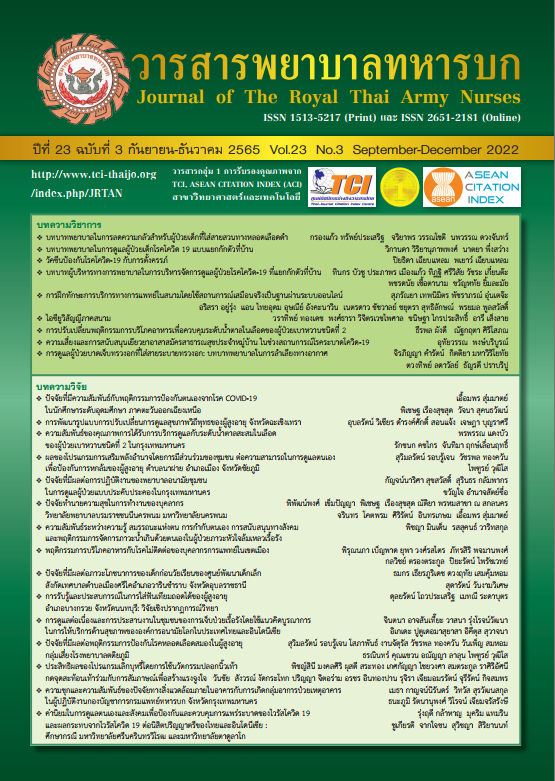The Relationships between Knowledge, The Number of Drugs Used and Drug Use Problems among Elderly Patients with Chronic Illness at A Medical Clinic
Keywords:
Rational drug use, Elderly, Chronic diseaseAbstract
This research aimed to study drug use knowledge, number, and problems related to drug use among elderly patients. The sample group was 88 elderly patients with chronic diseases who received services at medical clinics. The research instruments consist of the questionnaires of knowledge of drug use and problems related to drug use with a content validity index of 0.92 and 0.92, respectively. The reliability was analyzed using the Kuder-Richardson formula (KR-20) of 0.79 and Cronbach’s alpha coefficient formula of 0.80, respectively. Data were analyzed by descriptive statistics; frequency, percentage, mean, and standard deviation. The relationships among variables were analyzed using Pearson’s correlation coefficient and Spearman’s rank correlation coefficient statistic.
The results showed that the research samples had a score of drug use knowledge at a good level (M = 10.73, SD = 1.53) and a problem related to drug use at a low level (M = 1.36, SD = .65). Drug use knowledge was negatively associated with drug problems statistically (r = .194, P<.05). Besides, the number of drugs used was a statistically significant positive correlation with drug use problems (r = .185, P<.05). The results of the study can be used for nurses to educate elderly patients with chronic diseases who receive a variety of medications to promote rational drug use.
Downloads
References
Thai Gerontology Research and Development institute (TGRI). Situation of the Thai elderly 2020. Nakhon Pathom; Institute for Population and Social Research , Mahidol University. 2021. (in Thai)
Office of the National Economic and Social Development Council. The eleventh national economic and social development plan 2012-2016. Bangkok; Prime Minister’s Office. 2012. (in Thai)
Leetaweesuk J, Makee P, Charachan P, Yana P, Jindawattanawong P, Thiratanyaboon L, et al. Drug use behaviors of elderly patients with chronic disease in Chiang-Tong community Rahang sub-district, Muang-Tak district, Tak province [Dissertation]. Tak: King Taksinmaharaj Memorial Hospital Medical Education Center; 2016. (in Thai)
Mira JJ. Medication errors in the older people population. Expert review of clinical pharmacology. 2019;12(6):491-494.
Ruangritchankul S. Polypharmacy in the Elderly. Rama Med J. 2018; 41(1):95-104. (in Thai)
Chayowan N. The results of the research project on socio-economic and demographic effects of the elderly in Thailand. Institute of Demography Chulalongkorn University; 1988. (in Thai)
Tipkanajanaraykha K, Saleekul S. Role of Nurses in prevention and management of inappropriate medication use in older adults. Journal of The Royal Thai Army Nurses. 2019;20(1):31-39. (in Thai)
Kongkaew C. Drug Use in Thai elderly in lower northern region of Thailand. Bangkok: National Research Council of Thailand; 2014. Sponsored by Health Systems Research Institute. (in Thai)
National Drug Development National List of Essential Medicines Committee.Thai NationalFormulary Central nervous system. volume 1. Bangkok: Agricultural cooperative printingdemonstrations of Thai; 2010. (in Thai)
Intana J, Pannarong K, Tawetanawanich Y, Yatniyom P, Sirisabjanan L. Ensuring Medication Safety for Older People: A Protocol for Nursing Action. Journal of Prachomklao College of Nursing, Phetchaburi Province. 2021; 4(1) : 17-32. (in Thai)
Polit DF, Beck CT. Nursing research: Generating and assessing evidence for nursing practice. 8th ed. Baltimore: Lippincott Williams & Wilkins; 2008. p. 1-765.
Bloom BS, Hastings JT, Madaus GF. Handbook on formative and summative evaluation of student learning. New York: McGraw-Hill; 1971.
Best JW. Research in education. 3rd ed. New Jersey: Prentice Hall; 1977.
Thato R. Nursing research: Concepts to application. 3rd ed. Bangkok: Chulalongkorn University Printing House; 2018. (in Thai)
Ruangritchankul S. Polypharmacy in the Elderly. Ramathibodi Medical Journal. 2018;41(1): 95–104.
Bennis Nechba R, El M’barki Kadiri M, BennaniZiatni M, Zeggwagh AA, Mesfioui A. Difficulty in managing polypharmacy in the elderly: Case report and review of the literature. Journal of Clinical Gerontology and Geriatrics. 2015;6(1):30-3.
Gama RS, Passos LCS, Amorim WW, Souza RM, Queiroga HM, Macedo JC, et al. Older people’s knowledge of the purpose of drugs prescribed at primary care appointments. Revista da Associação Médica Brasileira. 2021; 67:1586-94.
Sears K, Woo KY, Almost J, Wilson R, Frymire E, Whitehead M, et al. Medication knowledge among older adults admitted to home care in Ontario during 2012-2013. Journal for healthcare quality: official publication of the National Association for Healthcare Quality. 2018; 40(3): e33-e45.
Bosch-Lenders D, Maessen DW, Stoffers HE, Knottnerus JA, Winkens B, van den Akker M. Factors associated with appropriate knowledge of the indications for prescribed drugs among community-dwelling older patients with polypharmacy. Age and ageing. 2016; 45(3): 402-8.
Panyathorn K, Beengmum N. Medication Use Behaviors in the elderly patient with Chronic disease at Chomsri village, Udonthani Province. Udonthani Hospital Medical Journal. 2019; 27(2) : 119-127. (in Thai)
Downloads
Published
How to Cite
Issue
Section
License
Copyright (c) 2023 Journal of The Royal Thai Army Nurses

This work is licensed under a Creative Commons Attribution-NonCommercial-NoDerivatives 4.0 International License.
บทความหรือข้อคิดเห็นใดใดที่ปรากฏในวารสารพยาบาลทหารบกเป็นวรรณกรรมของผู้เขียน ซึ่งบรรณาธิการหรือสมาคมพยาบาลทหารบก ไม่จำเป็นต้องเห็นด้วย
บทความที่ได้รับการตีพิมพ์เป็นลิขสิทธิ์ของวารสารพยาบาลทหารบก
The ideas and opinions expressed in the Journal of The Royal Thai Army Nurses are those of the authors and not necessarily those
of the editor or Royal Thai Army Nurses Association.






